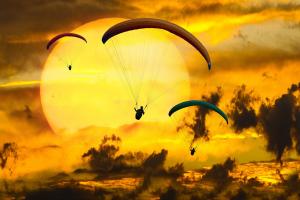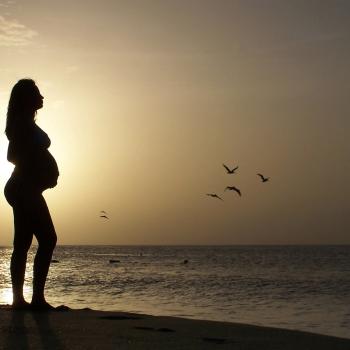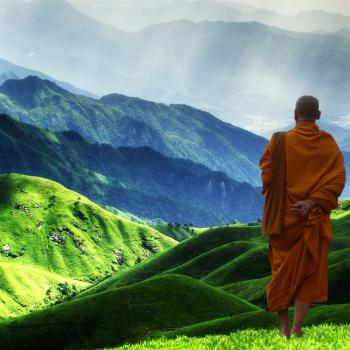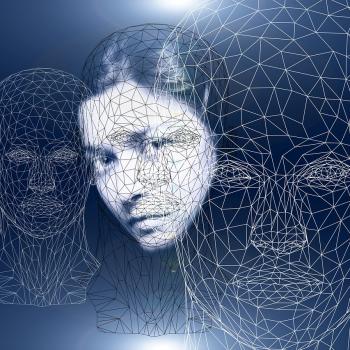
A. Introduction
There is an important difference between free will – the ability to do as I please – and freedom – the ability to do as pleases God. Free will is a faculty that can be used for good or bad, for building or destroying. Freedom, on the other hand, is always good because it is the essence of the soul and the object of enlightenment. Freedom does not mean that we’re just performing to satisfy the demands of a distant deity but, rather, to bring ourselves into perfect alignment with our own inner divinity. It’s not about being obedient, it’s about being whole.
Incarnation, then, is how we test the soul’s ability to experience freedom, even within the constraints of the spacesuit. Neither enlightenment nor freedom, however, are toggle switches – either on or off – but, rather, slider switches that can adjust the degree of luminosity. Not all enlightened beings are equally advanced and not all freedoms are identical.
B. The Debate
Materialistic scientists would have us believe that freewill is an illusion; that consciousness does not exist; and that our ‘apparent choices’ are simply the dictates of a ‘selfish gene’ using neurons and molecules to advance its agenda. Personally, I find this to be a pathetic contention. Quantum Mechanics tells us that atoms are 99.9999999% empty space. So, if we were to dump the empty space out of each atom in each molecule in each neuron of each brain of each human being who has ever lived since the advent of Homo Sapiens Sapiens (approximately 111 billion people), the total amount of actual matter harvested would be less than a single grain of sea sand. I choose to not believe that this one grain of sand is responsible for the Collected Works of Shakespeare, the art of Leonardo da Vinci, Relativity Theory or even my choice of breakfast cereal this morning.
Confusing matter with freewill is like confusing a hammer with the carpenter. To say freewill does not exist is to claim that you had no choice in saying, “freewill does not exist.” You are then averring that it was the robot-you that made the claim. So, why would you believe yourself or trust your own pronouncement, oh robot? To quote Neils Bohr, one of the originator-geniuses of Quantum Mechanics, “The meaning of life is this, that it has no meaning to say, life has no meaning!”
Here are some of the rational consequences of the denial of freewill: there can be
– no guilt for committing a crime
– no blame for causing injury to another
– no police force, court system or justice
– no credit for achievement – academic, athletic or artistic
– no ‘heaven’ or ‘hell’
– no trust, fidelity, responsibility
– no virtue or vice
– no meaning
In other words, no civilization.
Why would you want to operate from a belief system that creates meaninglessness, depression and hopelessness when you can, instead, operate from a belief system that creates meaning, serenity and trust? By their fruits you shall know them. If, as I believe, we co-create our own reality – since the only things we can perceive are our perceptions – then a reality of which we are hopeless, depressed co-creators is going to, itself, be damn hopeless and depressing! If you’re happy to be hopeless, please don’t come to my party.
C. Instinct and Learning
There’s a tradeoff between instinct and learning. Most critters start off with far more instinctual abilities than humans have; but humans have a much greater capacity to learn. So, if you graph performance, the critters are way ahead from birth and into early childhood but, thereafter, the human graph overtakes them. Hence, most critters hit the ground running – foals are up and frisking around the meadow within an hour of birth; cheetah cubs learn to hunt and are self-employed by age one; and little birds fly the nest within weeks.
Eventually, we catch up and surpass them, though not in all areas – we’ll never learn to fly, run as fast as a cheetah, see better than a hawk, hear better than a bat or smell better than a dog (unless we shower regularly!)
Part of the reason is that humans finish their embryology outside the womb. Over time, our brains have grown so big that, if we went full term ‘in utero’, we could never traverse the birth canal. So, we come with very few instincts intact: the ability to blink and burp and breathe – to name a few.
D. The Evolution of Freewill
Freewill lies on a spectrum that runs from pre-programmed ‘robots’ to ‘if I can think it, I’m free to do it.’ There is some form of intelligence all through the system, yet there can also be stagnation or even regression at any stage. In evolutionary time, including the future, life goes through these stages: physical, biological, emotional, rational, soul-full, Spirit-identified and non-dual union-with-Source. So, we’ve seen reptiles whose response to stimuli is fight or flight; then mammals who added emotions to the mix; and humans who brought the neo-cortex with its ability to think abstractly and invent time.
Each of these stages improves parenting and the education of the next generation e.g., unlike reptiles, who simply lay eggs and then leave them to their fate, mammals suckle and raise their young; and when it comes to human mammals, even the dads get into the act. And, perhaps, most importantly for the present discussion, each new stage increases the range of possible responses and, hence, the degree of freewill and freedom.
Let’s walk more slowly through this journey. At the pre-programmed, ‘robotic’ level, are inorganic forms e.g., mountains which respond very predictably to sun, wind, rain, snow etc. They don’t have the fight or flight instinct, don’t have emotions or parenting skills. Two mountains don’t fall in love, get married and give birth to a family of hillocks.
Plants, too, respond to environmental stimuli like sun, wind, rain, soil but they add a degree of mobility e.g., they can swivel and sway to face the sun or turn their backs to the wind; and they are masters of self-propagation, hijacking gravity, the wind, water, insects, animals and humans to become the unwitting mail carriers to deliver their love letters to other plants in an orgy of polyamory. They were the first to invent airmail and online dating.
Animals extended this mobility by learning to crawl, walk, run, swim and fly in order to meet their heart throbs and dine in fine outdoor vegetarian and carnivorous restaurants.
And then came humans with upgraded hardware and software. But, lest we think we’ve summited the pinnacle of evolution, there are, I believe, several new, significantly-upgraded versions in the works. For a quick preview, see the predictions of the great avatars.
E. Limitations on Freewill
There are, of course, several ways in which freewill is limited. For example, brain damage either ‘in utero’ as in Fetal Alcohol Syndrome or a post-partum injury. General health issues and physical disabilities can significantly limit our range of options. And we can all feel limited by being unable to realize imagined accomplishments e.g., win gold at the Olympics or an Oscar for starring in a movie.
Political regimes, laws and education – both secular and religious – restrict our options, as do ignorance, fear and societal expectations. However, some of these are simply apparent restrictions that, in fact, nudge us towards freedom at the expense of freewill.
F. The Future – Where Freewill Meets Freedom
St. Paul famously wrote, in his letter to the Romans, “The good that I would, I do not; it is the evil I would not that I find myself doing…” He is speaking here of the ego/soul dialectic. But, far from being a curse, this, in fact, is a blessing because incarnation is the gym in which we develop our spiritual muscle. This very struggle is what leads to enlightenment. It takes us from pre-rational to rational to post-rational; from pre-personal to personal to post-personal.
Paul is talking about the docking of two forms of intelligence; firstly, that of the organism itself (the host or ‘spacesuit’) and, secondly, that of the soul (the heaven-sent guest.) The organism operates on two principles: survival and procreation; while the soul’s two principles are: achieving Unity Consciousness and Unconditional Love for all of God’s creatures.
It’s a tenet of evolutionary biology that ontogeny (the progress of the individual) recapitulates (re-enacts) phylogeny (the progress of the species.) So, each human starts out as a single cell; becomes an aquatic animal, swimming in the amniotic fluid; becomes an amphibian at birth, eventually trading dry land for water; then operates as a little reptile (crawling) before developing emotions (becoming a mammal with an active limbic system); and, then, a hominid, mastering bi-pedalism and, finally, a member of Homo Sapiens Sapiens with language skills.
From here we morph into soul-realization on the way to Spirit-identification. And, finally, to non-dual union with Source. And freewill is a huge factor in this evolution.
To fully grok this trajectory, we have to transcend mere reason, just as mammals needed to go trans-reptilian in order to experience emotions, and hominids needed to transcend the limbic system to experience mathematics and poetry. So, why would evolution stop with Homo Sapiens Sapiens? Such a belief is simply the latest evidence of human hubris which formerly claimed that (a) Earth is the center of the cosmos; (b) the sun and the stars rotate about the Earth; (c) God made humans in a special act of creation; (d) the Jews are God’s chosen people; and (e) outside the Catholic Church there is no salvation.
By meeting each obstacle with confidence, courage and creativity, we are co-creating a cosmic family with the twin turbines of freewill and karma. Absent either one of these, all meaningful evolution grinds to a halt. The universe is a well-appointed laboratory which is designed to produce not guilt and meaninglessness but ecstasy and divine union.
We will know that we have co-created heaven on Earth when freewill and freedom are merely synonyms.











